六年级英语下册第一单元知识点
小学六年级下册英语第一单元必背词语及短语

小学六年级下册英语第一单元必背词汇及短语一、语音a—/ei/: cake, lake, datee—/i:/: these, evening, Chinesei—/ai/: kite, like, rideo—/au/: those , home, noseu—/ju:/: use, student, music,二、词汇形容词:famous著名的fat胖的thin瘦的动词:travel旅行made make的过去式show绐……看其他:along沿着anywhere任何地方三、短语winter activity冬季活动in winter在冬天winter vacation寒假climb a mountain爬山the Yangtze River长江 a long river一条长河take photos照相cold and windy寒冷多风go skating去滑冰on the lake 在湖上go back回到Ice and Snow Festival冰雪节a big ice city一座大冰城have fun玩得开心in the snow在雪里make a snowman堆雪人take a photo of.给……拍一张照片a lovely snowman一个可爱的雪人look at. 看……the Spring Festival春节Chinese New Year中国的新年in January在一月play with. 和……玩New Year’s money压岁钱have a good time 玩得开心四、常用表达式①Hi! 嗨!②How about you? 你呢?③Look. 看。
英语六年级下册第一单元知识点

英语六年级下册第一单元知识点English: In the first unit of the sixth-grade English textbook, students typically learn about various topics such as introducing oneself, talking about hobbies, describing family members, discussing daily routines, and expressing likes and dislikes. They are introduced to new vocabulary related to these themes, along with grammar points such as present simple tense, possessive adjectives, basic prepositions of place and time, and question forms. Reading passages and dialogues are provided to reinforce comprehension skills, and students are encouraged to engage in speaking activities to practice their oral communication. Additionally, they may learn about cultural aspects related to English-speaking countries, fostering a broader understanding of the language and its context. Throughout the unit, students engage in activities that promote listening, speaking, reading, and writing skills, aiming for comprehensive language acquisition.中文翻译: 在六年级英语教科书的第一单元中,学生通常会学习各种主题,如自我介绍,谈论爱好,描述家庭成员,讨论日常作息,以及表达喜好和不喜欢。
PEP英语六年级下册 Unit 1单元知识梳理

新版PEP六年级英语下册Unit 1知识点归纳一、必背词汇tall ------ taller 高的----更高的dinosaur 恐龙short ------ shorter 矮的/短的----更矮的/更短的hall 大厅long ------ longer 长的----更长的than 比strong------ stronger 强壮的----更强壮的both 两个都old ------ older 老的/旧的----更老的/更旧的meter 米形容词young------ younger 年轻的----更年轻的kilogram千克;公斤adj. small------ small 小的----更小的others size 号码thin ------ thinner 瘦的----更瘦的feet 脚heavy------heavier 重点----更重的wear 穿low------ lower 低地----更低地countryside乡村smart------smarter 聪明的----更聪明的shadow 影子;阴影become变成;开始变得辅+元+辅--------双写最后一个辅音字母+er辅音字母+y -----改y为i +erbig-----bigger 大的-----更大的happy-----happier 开心的-----更开心的thin-----thinner 瘦的-----更瘦的heavy-----heavier 重的------更重的fat-----fatter 胖的------更胖的funny-----funnier 滑稽的------更滑稽的二、重点句型⑴问年龄,身高,体重等How old are you? How tall are you? How heavy are you?---- I’m _______ (years old). ---- I’m ______metres tall. ---- I’m ______ kilograms .⑵问物品的情况:① How large is your room? 你的房间有多大?It’s __________ m2 (square meters.) 有_______ 平方米。
外研版一起点六年级下册Unit 1知识点汇总
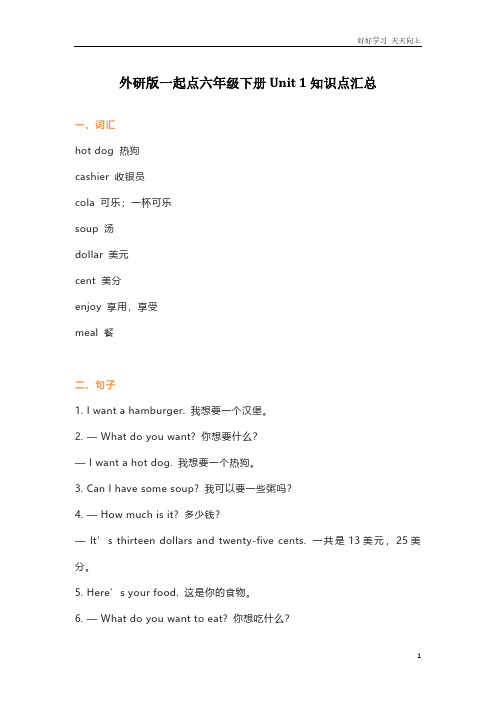
外研版一起点六年级下册Unit 1知识点汇总一、词汇hot dog 热狗cashier 收银员cola 可乐;一杯可乐soup 汤dollar 美元cent 美分enjoy 享用,享受meal 餐二、句子1. I want a hamburger. 我想要一个汉堡。
2. — What do you want? 你想要什么?— I want a hot dog. 我想要一个热狗。
3. Can I have some soup? 我可以要一些粥吗?4. — How much is it? 多少钱?— It’s thirteen dollars and twenty-five cents. 一共是13美元,25美分。
5. Here’s your food. 这是你的食物。
6. — What do you want to eat? 你想吃什么?— I want to eat some meat. 我想吃些肉。
7. Can I help you? 我可以帮你吗?8. — What do you want to drink? 你想喝什么?— Milk, please. 请来一杯牛奶。
三、句型结构1. I want + a/ an/ some... + 名词. 表示某人想要某物。
eg: I want some eggs. 我想要一些鸡蛋。
2. What do you want to eat/ drink? 询问对方想吃/ 喝什么。
eg: — What do you want to drink? 你想喝点什么?— A cup of coffee, please. 请来一杯咖啡。
3. — How much is ...? 询问某物多少钱。
— It’s ...eg: — How much is the coat? 这个外套多少钱?— It’s one hundred yuan. 一百元。
六年级下册英语第一二单元知识点
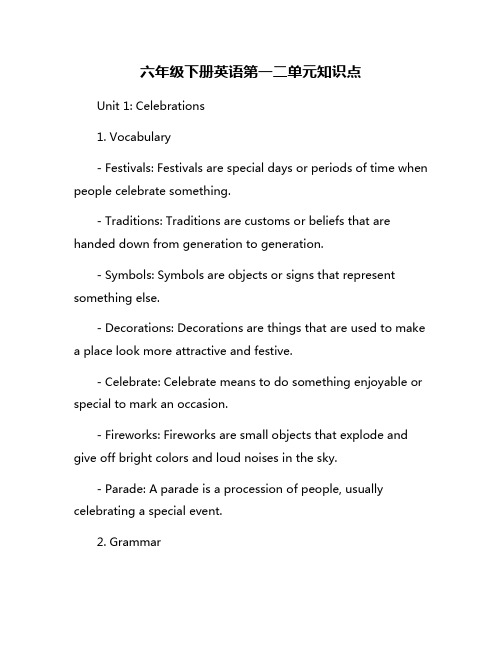
六年级下册英语第一二单元知识点Unit 1: Celebrations1. Vocabulary- Festivals: Festivals are special days or periods of time when people celebrate something.- Traditions: Traditions are customs or beliefs that are handed down from generation to generation.- Symbols: Symbols are objects or signs that represent something else.- Decorations: Decorations are things that are used to make a place look more attractive and festive.- Celebrate: Celebrate means to do something enjoyable or special to mark an occasion.- Fireworks: Fireworks are small objects that explode and give off bright colors and loud noises in the sky.- Parade: A parade is a procession of people, usually celebrating a special event.2. Grammar- Present simple tense: We use the present simple tense to talk about general truths, habits, and routines.- Adverbs of frequency: Adverbs of frequency tell us how often something happens. Some examples are always, usually, often, sometimes, and never.3. Reading and Writing- Reading comprehension: Reading comprehension is the ability to understand and interpret a text.- Writing a diary entry: A diary entry is a personal record of daily events and experiences.Unit 2: Nature1. Vocabulary- Habitat: A habitat is the natural environment where an animal, plant, or organism lives.- Endangered: If a species is endangered, it is at risk of becoming extinct.- Eco-friendly: Eco-friendly means not harmful to the environment.- Pollution: Pollution is the presence of harmful substances in the environment.- Extinct: Extinct means that a species no longer exists.- Conservation: Conservation is the protection and preservation of natural resources.2. Grammar- Modal verbs: Modal verbs are auxiliary verbs that express possibility, necessity, ability, permission, or obligation.- Comparatives and superlatives: Comparatives are used to compare two things, while superlatives are used to compare three or more things.3. Reading and Writing- Descriptive writing: Descriptive writing describes a person, place, or thing in detail.- Writing a persuasive text: Persuasive writing aims to convince the reader of a certain point of view or a call to action.In summary, the first two units of the sixth-grade English textbook cover vocabulary related to celebrations and nature, as well as grammar points such as the present simple tense, adverbs of frequency, modal verbs, and comparatives andsuperlatives. Students also practice reading comprehension, writing diary entries, descriptive writing, and persuasive texts.。
人教版六年级下册英语第一单元知识点
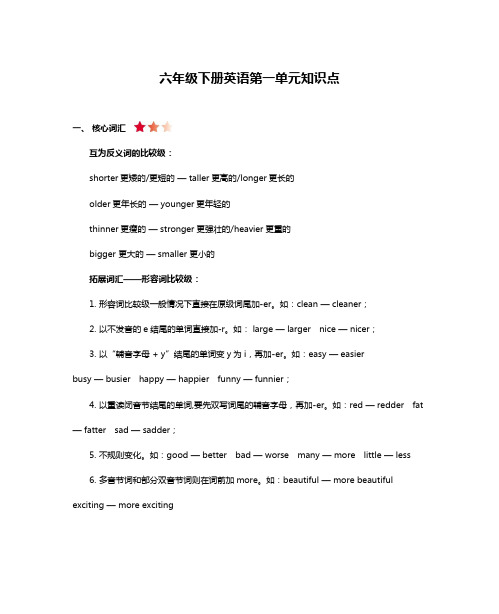
六年级下册英语第一单元知识点一、核心词汇互为反义词的比较级:shorter更矮的/更短的— taller更高的/longer更长的older更年长的— younger更年轻的thinner更瘦的— stronger更强壮的/heavier更重的bigger 更大的— smaller 更小的拓展词汇——形容词比较级:1. 形容词比较级一般情况下直接在原级词尾加-er。
如:clean — cleaner;2. 以不发音的e结尾的单词直接加-r。
如: large — larger nice — nicer;3. 以“辅音字母 + y”结尾的单词变y为i,再加-er。
如:easy — easierbusy — busier happy — happier funny — funnier;4. 以重读闭音节结尾的单词,要先双写词尾的辅音字母,再加-er。
如:red — redder fat — fatter sad — sadder;5. 不规则变化。
如:good — better bad — worse many — more little — less6. 多音节词和部分双音节词则在词前加more。
如:beautiful — more beautiful exciting — more exciting二、了解词汇dinosaur恐龙hall大厅 metre米(美式英语: meter) than比 both两个都kilogram千克;公斤countryside乡村lower(low的比较级)更低地shadow阴影;影子 smarter(smart的比较级)更聪明的 become开始变得;变成三、核心句型1. — How tall are you? 你有多高?— I'm 1.64 metres. 我身高1.64米。
2. — What size are your shoes, Mike? 迈克,你穿多大号的鞋?— Size 7. 7号。
(完整版)人教版六年级下册英语知识点总结
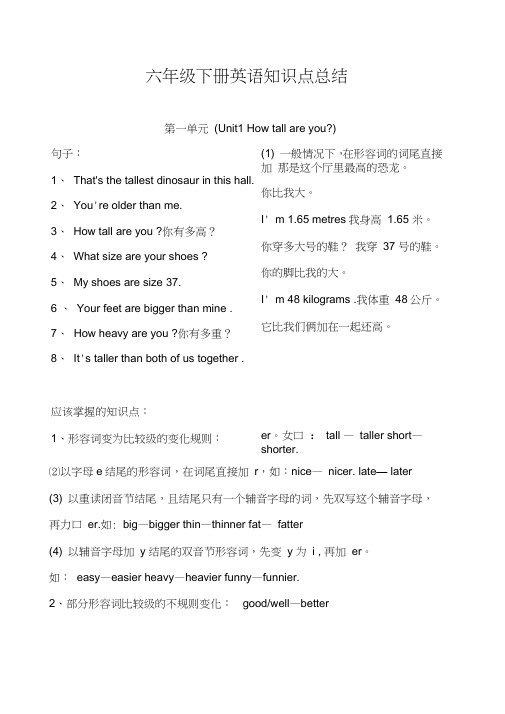
六年级下册英语知识点总结第一单元(Unit1 How tall are you?)句子:1、That's the tallest dinosaur in this hall.2、You're older than me.3、How tall are you ?你有多高?4、What size are your shoes ?5、My shoes are size 37.6 、Your feet are bigger than mine .7、How heavy are you ?你有多重?8、It's taller than both of us together .应该掌握的知识点:1、形容词变为比较级的变化规则:(1) 一般情况下,在形容词的词尾直接加那是这个厅里最高的恐龙。
你比我大。
I' m 1.65 metres我身高1.65 米。
你穿多大号的鞋?我穿37 号的鞋。
你的脚比我的大。
I' m 48 kilograms .我体重48公斤。
它比我们俩加在一起还高。
er。
女口: tall —taller short—shorter.⑵以字母e结尾的形容词,在词尾直接加r,如:nice—nicer. late— later(3) 以重读闭音节结尾,且结尾只有一个辅音字母的词,先双写这个辅音字母,再力口er.如: big—bigger thin—thinner fat—fatter(4) 以辅音字母加y 结尾的双音节形容词,先变y 为i , 再加er。
如:easy—easier heavy—heavier funny—funnier.2、部分形容词比较级的不规则变化:good/well—better3、 比较级的标志:tha n 。
弓I 导比较级的特殊疑问词: Which 。
句子结构为:Which+名词+is+形容词比较级。
比较级+and+比较级表示:越来越 ...4、 A 与 B 比较的句子结构: A+be 动词+形容词比较级 +than+B. 否定句句子结 构:A+be 动词+not+形容词比较级+than+B. —般疑问句句子结构:Be 动词+A + 形容词比较级 +than+B ?A 比B 多多少的句子结构:A+be 动词+数字+单位+形容词比较级+than+B 。
六年级下册英语书电子版译林版课堂笔记第一单元

译林版小学英语六年级下册第一单元知识点【Story time部分】课文详细解读1.in the forest在森林里rge and strong大而强壮的3.walk by走过,路过4.wake清醒,醒来–woke(动词过去式)wake up醒来动词+副词结构,注意把宾语放在动词后,wake sb.up使某人醒来5.some day某一天(用于说话时刻之后的将来某一天)6.small and weak又小又弱ugh loudly大声地笑8.let go让…走9.the next day第二天10.catch抓住-caught(动词过去式)catch the lion with a large net用一张大网抓住了狮子with此处表示方式,用…的工具,是介词而非动词with a large net用一张大网11.bit the net with his sharp teeth用他的尖牙咬这张网bite咬-bit(动词过去式)with his sharp teeth用他的尖牙12.help帮助help sb.(to)do sth.帮助某人做某事help sb.with sth.在某方面帮助某人词组举例:help me learn English=help me with my English在英语学习方面帮助我13.get out出去14.just then就在那时15.make制作-made(动词过去式)make a big hole in the net with his teeth用他的牙在网上咬了一个大洞16.from then on从那时起(过去时间标志)17.become friends变成朋友become成为,变成became(动词过去式)【Story time课文语段语法精讲】1.There was a lion in the forest.森林里有一只狮子。
该句为“There be…”句型在一般过去式中的用法was是is的过去式;后面加的名词为复数时,则需使用There were…句式。
人教PEP版英语六年级下册Unit 1-4知识点总结(期末复习)
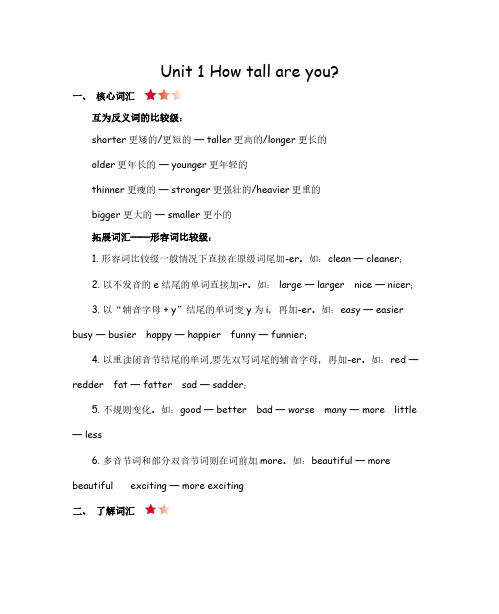
Unit1How tall are you?一、核心词汇互为反义词的比较级:shorter更矮的/更短的—taller更高的/longer更长的older更年长的—younger更年轻的thinner更瘦的—stronger更强壮的/heavier更重的bigger更大的—smaller更小的拓展词汇——形容词比较级:1.形容词比较级一般情况下直接在原级词尾加-er。
如:clean—cleaner;2.以不发音的e结尾的单词直接加-r。
如:large—larger nice—nicer;3.以“辅音字母+y”结尾的单词变y为i,再加-er。
如:easy—easier busy—busier happy—happier funny—funnier;4.以重读闭音节结尾的单词,要先双写词尾的辅音字母,再加-er。
如:red—redder fat—fatter sad—sadder;5.不规则变化。
如:good—better bad—worse many—more little —less6.多音节词和部分双音节词则在词前加more。
如:beautiful—more beautiful exciting—more exciting二、了解词汇dinosaur恐龙hall大厅metre米(美式英语:meter)than比both两个都kilogram千克;公斤countryside乡村lower(low的比较级)更低地shadow阴影;影子smarter(smart的比较级)更聪明的become开始变得;变成三、核心句型1.—How tall are you?你有多高?—I’m1.64metres.我身高1.64米。
2.—What size are your shoes,Mike?迈克,你穿多大号的鞋?—Size7.7号。
3.—How heavy are you?你体重多少?—I’m48kilograms.我体重48公斤。
六年级下册英语知识素材 Unit 1 The lion and the mouse知识点及练习 译林

Unit1The lion and the mouse【教学目标】1.能够掌握loudly,sadly等副词的用法2.能够用英语有条理地使用一般过去时讲述童话故事3掌握large,walk by,wake…up,some day,from the n on的用法4.能够学会“第二天“的英文表达5.掌握help…up用法6.特殊疑问句的语调降调【教学重点】副词在句子中的基本用法;重点四会单词的用法【教学难点】副词的使用【教学过程】一、复习本单元重点单词及其用法1.mouse老鼠n.注意:复数mice发音:ou/au/mouse,house,shout,out,about,mouth,playground/ʌ/country,touch,cousin,y oung/u/should,could,would练习:() A.y oung B.mouse C.h ou se D.out 例:想要吃了老鼠want to eat the mouse让老鼠走let the mouse go抓住老鼠catch the mouse” ”盒子里有一只老鼠。
There is a mouse in the box.狮子有没有吃了老鼠?Did the lion eat the mouse?2. large 大的 adj.反义词:small近义词:big发音:ar /a:/ large, car , farm, card, arm, park, far , star/ ɔ:/warm, quarter练习:( ) A. park B. g ar de n C. warm D .large例:一个大城市 a large city用一张大网抓住狮子 catch the lion with a large net3. strong 强大的,强壮的 adj.例:一头又大又强壮的狮子 a large and strong lion强风 strong wind这头狮子非常强壮。
六年级下册第一单元英语知识点

Unit 1: English Knowledge Points for Grade 6Vocabulary:New words related to daily life, school, and hobbies.Phrases and expressions commonly used in conversations.Grammar:Simple present tense: used to describe habitual actions or general truths. Basic sentence structure: subject + verb + Object (SVO).Listening and Speaking:Understanding and responding to questions about daily activities, school life, and hobbies.Asking and answering questions using "What?", "Where?", "When?", "Who?", and "How?"Reading and Writing:Reading comprehension skills to understand short texts and answer questions. Writing basic sentences and paragraphs about daily life, school, and hobbies.Cultural Understanding:Learning about different cultures and customs through language.词汇:与日常生活、学校生活和兴趣爱好相关的新词汇。
人教版PEP版英语六年级下册第一单元重点知识集锦

PEP六年级下册单元重点知识集锦Unit1一.单词(教材54页Unit1,共计22个)二.短语1.how heavy多重2.what size什么尺码3.how tall多高4.both of us我们两个5.more dinosaurs更多的恐龙6.how old多大7.go shopping去购物8.go hiking去远足9.have a look at看一看10.think of想起11.any other任何其他的12.go on a trip to去旅行13.go down下沉、下降14.get lower and lower变得越来越低15.my shadow我的影子16.agree with同意17.talk about谈论18.have a try试一试19.an excellent goal keeper一个优秀的足球守门员20.need teamwork需要团结三.知识点1.how的用法(1)问身体健康等情况。
How are your parents?你父母身体好吗?How are things in your father’s factory?你爸爸厂里的情况怎么样?(2).问天气状况。
How is the weather today?今天天气怎么样?(3)询问方式。
How does your mother go to work every day?你妈妈每天怎么去上班?How can I carry the box upstairs?我怎样才能把这箱子搬到楼上呢?(4)询问程度。
How do you like this book?你觉得这本书怎么样?(5)How old问年龄、年代。
How old is your friend?你朋友多大了?How old is the bridge?这座桥有多少年代了?(6)How many问可数名词数量。
常将可数名词复数紧随其后。
如:How many pictures are there on the wall?墙上有多少幅画?How many glasses of milk would you like?你们想要几杯牛奶?(7).How much询问不可数名词的数量、物品的价格。
2020年北京课改版六年级英语下册第一单元Unit 1 What are you looking for知识清单
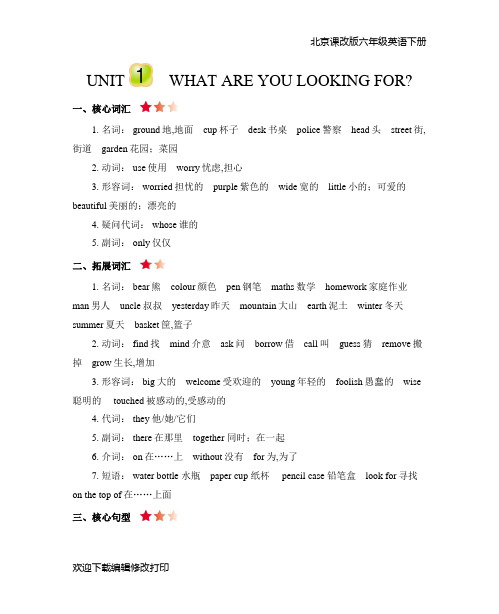
UNIT WHAT ARE YOU LOOKING FOR?一、核心词汇1. 名词: ground地,地面cup杯子desk书桌police警察head头street街,街道garden花园;菜园2. 动词: use使用worry忧虑,担心3. 形容词: worried担忧的purple紫色的wide宽的little小的;可爱的beautiful美丽的;漂亮的4. 疑问代词: whose谁的5. 副词: only仅仅二、拓展词汇1. 名词: bear熊colour颜色pen钢笔maths数学homework家庭作业man男人uncle叔叔yesterday昨天mountain大山earth泥土winter冬天summer夏天basket筐,篮子2. 动词: find找mind介意ask问borrow借call叫guess猜remove搬掉grow生长,增加3. 形容词: big大的welcome受欢迎的young年轻的foolish愚蠢的wise 聪明的touched被感动的,受感动的4. 代词: they 他/她/它们5. 副词: there在那里together 同时;在一起6. 介词: on在……上without没有for为,为了7. 短语: water bottle 水瓶paper cup 纸杯 pencil case 铅笔盒look for寻找on the top of在……上面三、核心句型1. — What are you looking for, Sara? 萨拉,你在找什么?— I’m looking for my water bottle. I can’t find it. 我正在找我的水瓶。
我找不到它了。
解读:此句是what 引导的现在进行时的特殊疑问句,用来询问某人正在做什么事。
举一反三:— What are you doing here? 你在这里做什么呢?— I’m waiting for my sister. 我正在等我的姐姐。
(完整版)译林版六年级英语下册各单元知识点归纳

Unit 1 The lion and the mouse 知识汇总一、四会单词rge大的2. strong强壮的3. quietly安静地;小声地4. Weak虚弱的5. loudly 大声地6. happily开心地;高兴地二、三会单词老鼠mouce 复数mice 走过,路过walk by 吵醒,叫醒,弄醒,醒醒wake …up其中一天same day 释放不能,放开let… go 第二天the next day 网net 咬bite 锋利的,尖的sharp难过地,伤心地sadly 就在那时just then 不久,很快soon 从那时起from then on 欢呼cheer 打,击hit 深的deep 够得着reach迅速地,快地quickly 把……倒入pour …into 三、短语积累狮子和老虎 the lion and the mouse mouse: 复数 mice 辨析 mouth嘴巴 month月份又大又强壮large and strong 又小又弱small and weak走过… walk by 走过森林walk by the forest把狮子叫醒 wake the lion up (代词宾格放中间) wake me up 我能在其中一天帮助你I can help you some day 将来不确定的其中一天Some day:安静地说say quietly quiet→quietly 大声地笑道laugh loudly loud→loudly 让狮子走let the mouse go let sb do 第二天the next day用一个大网抓住狮子catch the lion with a large net catch过去式:caught 用他的锋利的牙齿咬网 bite the net with his sharp teeth (tooth) bite过去式: bit 出来get out伤心地问道ask sadly sad→sadly 就在那个时候just then在网里弄了个大洞make a big hole in the net 开心地说say happily happy→happily 从那时起from then on他会说什么? what will he say? 没关系It doesn’t matter.伊索寓言Aesop’s Fables一本中文成语书a Chinese idiom book 开心地打乒乓play table tennis happily 擅长be good at+名词 // be good at +动词ing大声地为他们欢呼 cheer for them loudly cheer for为…欢呼击球用力hit the ball hard hit打,击 (过去式: hit): 最后finally 近意: at last 太深too deep我够不到I can’t reach it reach到达 reach my school 迅速地拿一些水来bring some water quickly 把它倒进洞里pour it in the hole 干得好! Well done!四、四会句子The mouce said quietly. 老鼠小声地说。
小学英语人教精通版六年级下册重点归纳

小学英语人教精通版六年级下册重点归纳第一单元Unit1 I went to Sanya for my holidays.重点单词:Sun 太阳moon月亮star星星Learn 学习;学到word 单词;词blackboard黑板say 说subject学科but 但是yesterday昨天why 为什么use用重点短语:1.by plane 乘飞机2.at night 在晚上3.at home 在家里4.a lot of 很多5.go to the beach 去沙滩6.do tasks 做任务7.act in drama 表演戏剧8.stay at home 待在家里9.have a party 聚会10.enjoy Spring Festive 过春节11.listen to music 听音乐12.speak English 讲英语13.read English 读英语14.write E n glish 写英语15.talk in English n用英语交谈16.play in English 用英语玩游戏17.enjoy sunbathing享受日光浴18.have an English party举办英语聚会19.enjoy the moon and stars看月亮和醒醒20.learn from each other 互相学习。
重点句型:1. We have learned a lot of English words我. 们学了很多英语单词。
2. We learned from each other我. 们互相学习。
2.What did you do for your holidays?你假期做了什么?3.I went to Sanya.我去了三亚。
4.We are very interested in English我. 们对英语很感兴趣。
5.How did you learn English?你(们)是怎么学英语的?6.We learned English by doing things我. 们通过做事情来学英语。
牛津小学英语六年级下册知识点总结(词组+句型)
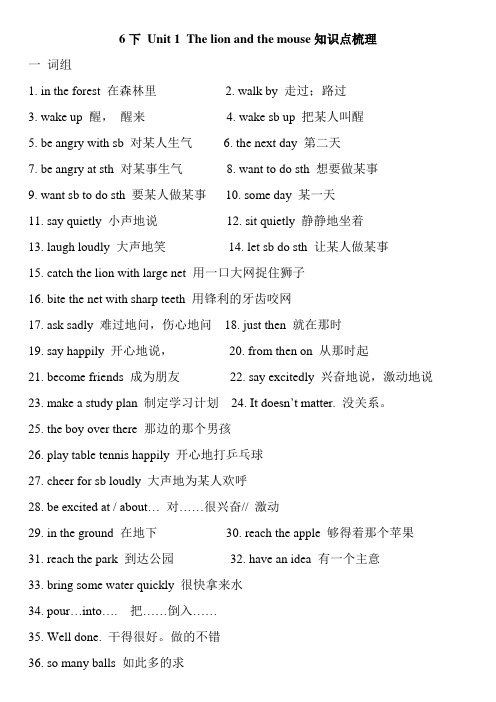
6下Unit 1 The lion and the mouse知识点梳理一词组1. in the forest 在森林里2. walk by 走过;路过3. wake up 醒,醒来4. wake sb up 把某人叫醒5. be angry with sb 对某人生气6. the next day 第二天7. be angry at sth 对某事生气8. want to do sth 想要做某事9. want sb to do sth 要某人做某事10. some day 某一天11. say quietly 小声地说 12. sit quietly 静静地坐着13. laugh loudly 大声地笑14. let sb do sth 让某人做某事15. catch the lion with large net 用一口大网捉住狮子16. bite the net with sharp teeth 用锋利的牙齿咬网17. ask sadly 难过地问,伤心地问18. just then 就在那时19. say happily 开心地说,20. from then on 从那时起21. become friends 成为朋友22. say excitedly 兴奋地说,激动地说23. make a study plan 制定学习计划24. It doesn’t matter. 没关系。
25. the boy over there 那边的那个男孩26. play table tennis happily 开心地打乒乓球27. cheer for sb loudly 大声地为某人欢呼28. be excited at / about… 对……很兴奋// 激动29. in the ground 在地下 30. reach the apple 够得着那个苹果31. reach the park 到达公园32. have an idea 有一个主意33. bring some water quickly 很快拿来水34. pour…into….把……倒入……35. Well done. 干得很好。
六年级英语下册第一单元知识点和课文翻译
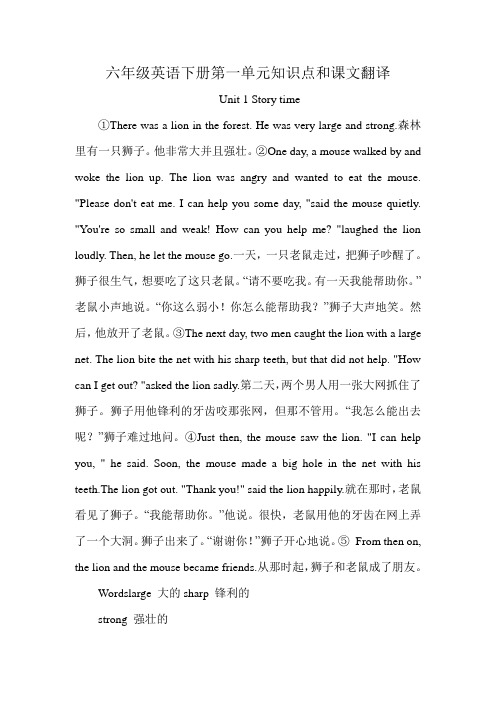
六年级英语下册第一单元知识点和课文翻译Unit 1 Story time①There was a lion in the forest. He was very large and strong.森林里有一只狮子。
他非常大并且强壮。
②One day, a mouse walked by and woke the lion up. The lion was angry and wanted to eat the mouse. "Please don't eat me. I can help you some day, "said the mouse quietly. "You're so small and weak! How can you help me? "laughed the lion loudly. Then, he let the mouse go.一天,一只老鼠走过,把狮子吵醒了。
狮子很生气,想要吃了这只老鼠。
“请不要吃我。
有一天我能帮助你。
”老鼠小声地说。
“你这么弱小!你怎么能帮助我?”狮子大声地笑。
然后,他放开了老鼠。
③The next day, two men caught the lion with a large net. The lion bite the net with his sharp teeth, but that did not help. "How can I get out? "asked the lion sadly.第二天,两个男人用一张大网抓住了狮子。
狮子用他锋利的牙齿咬那张网,但那不管用。
“我怎么能出去呢?”狮子难过地问。
④Just then, the mouse saw the lion. "I can help you, " he said. Soon, the mouse made a big hole in the net with his teeth.The lion got out. "Thank you!" said the lion happily.就在那时,老鼠看见了狮子。
六年级英语下Unit1知识点梳理

第一单元知识点梳理短语:1.多高how tall2.我们两个加起来both of us together3.在那边over there4.那么大那么高so big and tall5.多大how old6.看一看have a look7.多大码what size 8.橱窗里的那些鞋子those shoes in the window 9.在中国in China 10. 40码的鞋size 40 shoes 11.多重how heavy 12.变得越来越低get lower and lower 13. 落下go down 14. 长得更老grow older 15.长得更高grow taller单词young—younger更年轻的old -older更年长的tall- taller更高的short-shorter更矮的long-longer更长的thin-thinner更瘦的heavy-heavier更重的big-bigger更大的small -smaller更小的strong -stronger更强壮的句子1. That's the tallest dinosaur in this hall. 那是这个厅里最高的恐龙。
2. You're older than me.你比我大。
3. How tall are you?你有多高?I'm 1.65 meters.我身高1.65米。
4. What size are your shoes?你穿多大号的鞋。
My shoes are size37.我穿37号的鞋。
5. Your feet are bigger than mine.你的脚比我的大。
6. How heavy are you?你有多重?I'm 48 kilograms.我体重48公斤。
7. It’s taller than both of us together. 它比我俩加起来还高。
六年级下册英语第一单元总结
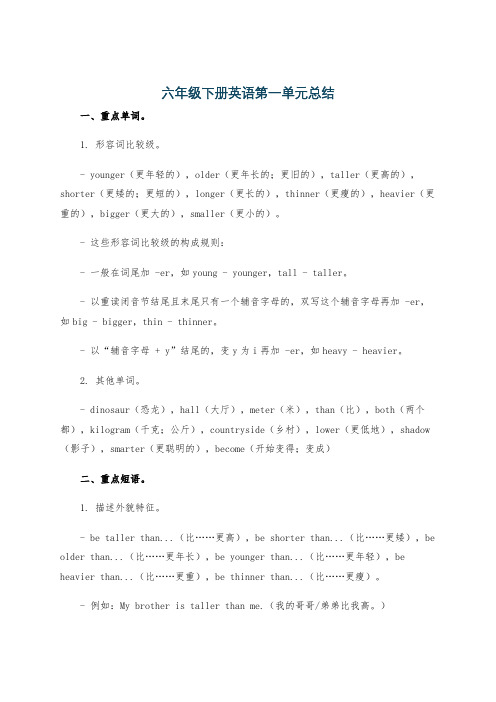
六年级下册英语第一单元总结一、重点单词。
1. 形容词比较级。
- younger(更年轻的),older(更年长的;更旧的),taller(更高的),shorter(更矮的;更短的),longer(更长的),thinner(更瘦的),heavier(更重的),bigger(更大的),smaller(更小的)。
- 这些形容词比较级的构成规则:- 一般在词尾加 -er,如young - younger,tall - taller。
- 以重读闭音节结尾且末尾只有一个辅音字母的,双写这个辅音字母再加 -er,如big - bigger,thin - thinner。
- 以“辅音字母 + y”结尾的,变y为i再加 -er,如heavy - heavier。
2. 其他单词。
- dinosaur(恐龙),hall(大厅),meter(米),than(比),both(两个都),kilogram(千克;公斤),countryside(乡村),lower(更低地),shadow (影子),smarter(更聪明的),become(开始变得;变成)二、重点短语。
1. 描述外貌特征。
- be taller than...(比……更高),be shorter than...(比……更矮),be older than...(比……更年长),be younger than...(比……更年轻),be heavier than...(比……更重),be thinner than...(比……更瘦)。
- 例如:My brother is taller than me.(我的哥哥/弟弟比我高。
)2. 地点短语。
- in the countryside(在乡村),in the hall(在大厅里)三、重点句型。
1. 比较级句型。
- A+be动词+比较级+than + B.(A比B更……)- 例如:The giraffe is taller than the deer.(长颈鹿比鹿更高。
- 1、下载文档前请自行甄别文档内容的完整性,平台不提供额外的编辑、内容补充、找答案等附加服务。
- 2、"仅部分预览"的文档,不可在线预览部分如存在完整性等问题,可反馈申请退款(可完整预览的文档不适用该条件!)。
- 3、如文档侵犯您的权益,请联系客服反馈,我们会尽快为您处理(人工客服工作时间:9:00-18:30)。
narrow
cleverer
narrower
cleverest
narrowest
其他双音节词和多音节词,在前面加more, most来构成比较级和最高级。
原级
比较级
最高级
beautiful
interesting
important(重要的)
more beautiful
more interesting
theirs他(她,它)们的
用法
用来做主语,通常放在句子的最前面.Iam a student .
用来做宾语,常放在句子最后面You’re shorter thanhim.
必须跟名词连用My penis blue .
单独使用,不用跟名词.因为它本身包含前面提到的名词.常放在句子最后.This is your ruler .That ismine.
六年级英语下册单元知识点
第一单元
形容词的比较等级
大多数形容词有比较级等级的变化,即原级、比较级和最高级,用来表示事物的等级差别,原级即形容词的原形,比较级和最高级有规则变化和不规则变化两种。
1.规则变化
单音节词和少数双音节词,加词尾-er, -est来构成较级和最高级。
构成法
原级
比较级
最高级
一般单音节词末尾加-er, -est
tall
great
taller
greater
tallest
greatest
以不发音的e结尾的单音节词和少数以-le结尾的双音节词只加-r, -st
nice
large
able
nicer
larger
abler
nicest
largest
ablest
以一个辅音字母结尾的闭音节单音节词,双写结尾的辅音字母,再加-er, -est
big
thin
hot
bigger
thinner
hotter
biggest
thinnest
hottest
“辅音字母+y”结尾的双音节词,改y为i,再加-er, -est
early
easy
earlier
easier
earliest
easiest
少数以-er, -ow结尾的双音节词末尾加-er, -est
You(你,你们)
you(你,你们)
your(你,你们)的
yours(你,你们)的
He(他)
him(他)
his(他)的
his(他)的
She她
her她
her她的
hers她的
It它
it它
its它的
its它的
We我们
us我们
our我们的
ours我们的
They他(她,它)们
them他(她,它)们
their他(她,它)们的
more important
mostbeautiful
most interesting
most important
2.不规则变化
原级
比较级
最高级
good(好的)well(健康的)
better
best
bad(坏的)ill(有病的)
பைடு நூலகம்worse
worst
old
older (elder)
oldest (eldest)
many much(多的)
more
most
little(少的)
less
least
far(远的)
farther (further)
farthest(furthest)
人称的主格、宾格,形容词性物主代词和名词性物主代词
主格
宾格
形容词性物主代词
名词性物主代词
单词
I (我)
me (我)
my(我)的
mine(我)的
(mine=my ruler .)
